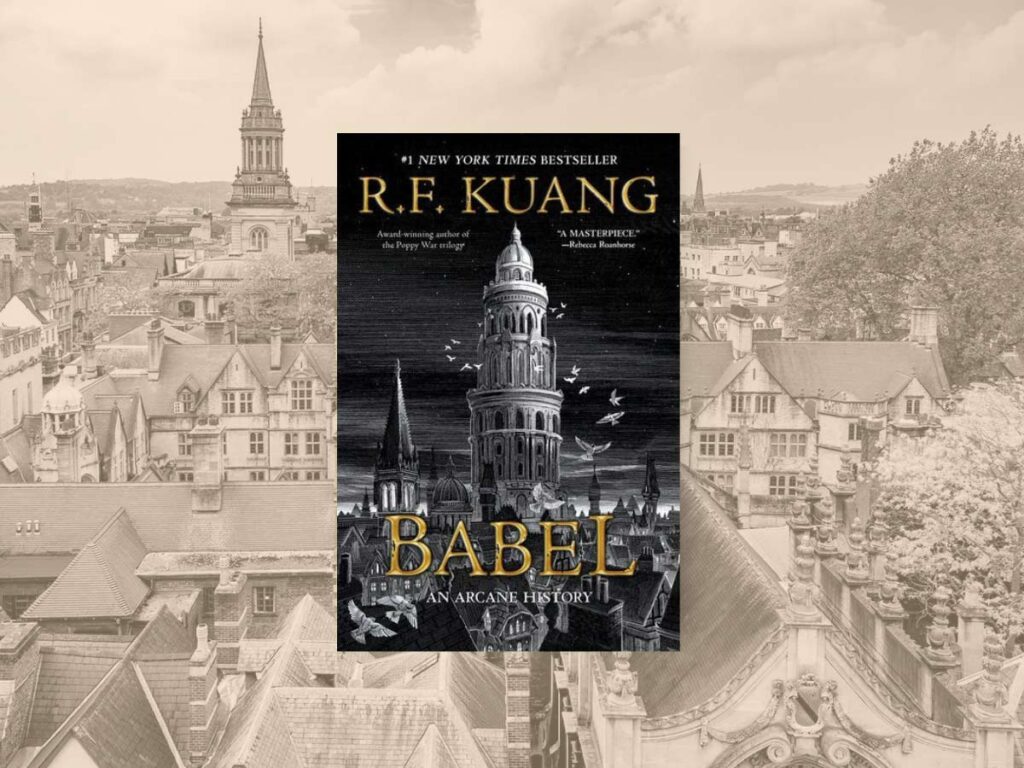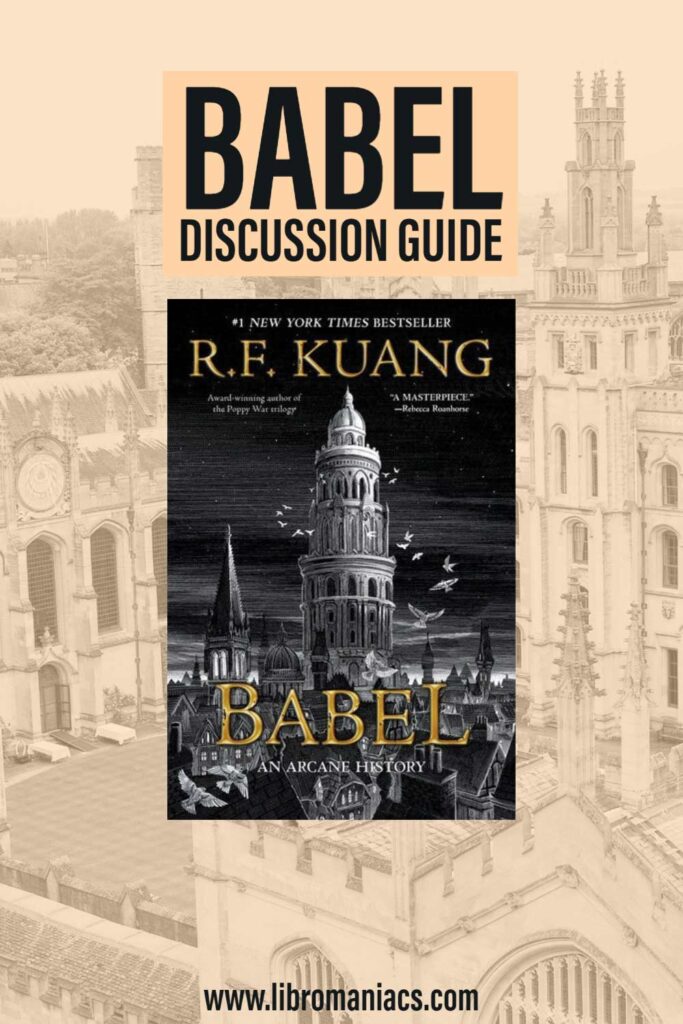Babel (Or the Necessity of Violence: An Arcane History of the Oxford Translators’ Revolution) is R.F. Kuang’s answer to what happens when colonialism, the power of language and a large dose of hubris collide, tumbling into a magical mess.
These 560 pages are packed with academic thoughts on the nature of translation, magical world-building and no small amount of action. There are also some themes related to found family, coming of age, racism, class dynamics, and what it means to resist. Whether you loved it or hated it (and the reviews are indeed somewhat mixed), your book club will find a lot to talk about. We’ll help you get started with our Babel book club questions.
This discussion guide for Babel include a synopsis, 10 discussion prompts and a sampling of those divergent reviews. If you loved the book, we’ve also got suggestions for some related reads to add to your TBR pile.

(This article contains affiliate links. This means that if you choose to purchase, I’ll make a small commission.)
Synopsis for Babel (Or the Necessity of Violence: An Arcane History of the Oxford Translators’ Revolution)
(We always chose to provide the publisher synopsis because we feel that it’s worthwhile to discuss whether the official book description actually squared with your experience of the book.)
Babel (Or the Necessity of Violence: An Arcane History of the Oxford Translators’ Revolution), R.F. Kuang
(Seriously, this title is so long, we’re just going to call it Babel from now on.)
Traduttore, traditore: An act of translation is always an act of betrayal.
1828. Robin Swift, orphaned by cholera in Canton, is brought to London by the mysterious Professor Lovell. There, he trains for years in Latin, Ancient Greek, and Chinese, all in preparation for the day he’ll enroll in Oxford University’s prestigious Royal Institute of Translation—also known as Babel.
Babel is the world’s center for translation and, more importantly, magic. Silver working—the art of manifesting the meaning lost in translation using enchanted silver bars—has made the British unparalleled in power, as its knowledge serves the Empire’s quest for colonization.
For Robin, Oxford is a utopia dedicated to the pursuit of knowledge. But knowledge obeys power, and as a Chinese boy raised in Britain, Robin realizes serving Babel means betraying his motherland. As his studies progress, Robin finds himself caught between Babel and the shadowy Hermes Society, an organization dedicated to stopping imperial expansion. When Britain pursues an unjust war with China over silver and opium, Robin must decide…
Can powerful institutions be changed from within, or does revolution always require violence?
10 Babel Book Club Questions
These questions have been tailored to this book’s specific reading experience, but if you want more ideas, we also have an article with 101 generic book club questions.
- Kuang includes a forward which explains how she warped some of actual Oxford to fit her fictional narrative and alternate universe. Was it necessary for her to provide the forward? When you read about a place you know, do changes or inaccuracies trip you up?
- The book covers a lot of academic topics like etymology and power dynamics in international trade. But there was also the world-building with silver magic, and some major action sequences.
Of those three (academic topics, magic, and action), which would you have wanted more of and which would you have wanted less of? - Professor Lowell says to Robin, “Laziness and deceit are common traits among your kind. This is why China remains an indolent and backwards country while her neighbors hustle towards progress…You must resist these traits, Robin. You must learn to overcome the pollution of your blood…”
And yet, Robin was also Lowell’s blood son and half British. What explains Lowell’s cognitive dissonance on this topic? - During the Babel orientation Robin “…felt a thrum of excitement at the thought that perhaps his unbelonging did not doom him to existing forever on the margins, that perhaps, instead, it made him special”.
How did that work out for him and his cohort of friends? - “And Robin found it incredible, how this country, whose citizens prided themselves so much on being better than the rest of the world, could not make it through an afternoon tea without borrowed goods”
The book paints a scathing portrait of England’s colonialist ambitions, fed by greed and hubris. Have you read other fiction or non-fiction on colonialism? How does Kuang’s depiction of colonialism square with what you know about the matter? - Consider Robin’s story arc. Was it a matter of maturation and then radicalization? Or was he simply a frog slowly boiling in the water, who couldn’t back down once it bubbled over?
- Robin lives a splintered life. He can pass as an Englishman, but he’s also derided as a “stupid Chinaman”. He loves Babel, but also hates it. He appreciates the opportunities that Lowell gave him, but then Robin killed him in a fit of rage.
How did you respond to Robin’s inconsistencies. Discuss some of their causes. - Chapter Thirty has one sentence, “Westminster Bridge fell.”
There was a lot of disagreement in the tower about it. Some felt that they went too far. But Robin felt that “This is how colonialism works. It convinces us that the fallout from resistance is entirely our fault, that the immoral choice is resistance itself rather than the circumstances that demanded it.”
Where do you lay the blame? Would you have let the Westminster bridge fall? How far can/should a resistance movement go? - The cover flap poses the question, “Can powerful institutions be changed from within, or does revolution always require violence?”
What do you think? Can you think of examples in history where each method has worked? - Descriptions of the book compare it to a cross between Jonathan Strange & Mr. Norrel (magic in Britian) and The Secret History (dark academia) But the class war, resistance movement, and ultimate barricading of the tower is also reminiscent of Le Miserable.
What other literary references do you see in Babel? - BONUS QUESTION: If you could get your hands on a clever bit of silverwork to help you with something in your everyday life, what would that be?
Selected Reviews for Babel
“Welcome to the party. Let me introduce you: Subtlety, meet Ms. Kuang; Ms. Kuang, meet Nuance. I see you’ve already met Didacticism, Repetitiveness and Overexplaining, so no intros needed there.”
“One of the most magnificent things about Babel is its characterizations, especially for Robin Swift. In one book, less than 700 pages long, Kuang managed to meticulously introduce and develop Robin Swift. His character development and story arc felt immense. Seriously, by the end of the novel, try to look back to the beginning of the novel, and you will see how far Robin Swift has changed. Plus, his character development never felt forced. His grief, rage, dilemma, struggles, kindness, and relatively brief moments of happiness felt so genuine.”
To me, it felt very much like reading a textbook. Dry regurgitation of a linguistics or postcolonial lecture. The author uses Oxford as a setting and the later Industrial Revolution as a historical template, adding very little that was new to any of it […] This book felt similar to Ninth House or a more basic version of The Secret History. Which is to say, unbearably dull.”
“Babel has the weight of a modern literary classic, although it is a unique blend of historical fiction, fantasy, and non-fiction. Kuang’s writing can be very technical, and often reads like a textbook. Despite the dense, lecture-like paragraphs about etymology and the history of language, Babel is incredibly immersive […] Babel is passionate, scathing, incendiary, fervent. It has all the inevitability and gravity of a tidal wave, a massive force crashing into me, sweeping me away.”
3 Books Like Babel
If you want to dive into more of the academia with magic angle, we have a whole article on books set in magical schools. You could also read and use our discussion guide for Fourth Wing, which features a deadly dragon academy.
Kuang is on a roll and her Yellowface also deals with themes of racism, but in a more modern day setting. Here’s our Yellowface discussion guide.
If you liked the dark academia element, we’ve also got a list of books similar to The Secret History, which are worth a look. And for more school kids in peril, try our list of books like The Hunger Games.

The Dictionary of Lost Words, Pip Williams
If you really loved the word nerd angle of Babel, this would be a great next read.
It’s set in the early 1900’s during the development of the very first Oxford English Dictionary (OED). Esme’s father works in the Scriptorium, which is a fancy word for the garden shed that James Murry and his team used while developing the OED.
Esme spends time under the big table in the Scriptorium and she gathers word slips that are lost, discarded or otherwise don’t make the cut into the dictionary. Over time, she begins to realize that the discarded words tend to relate to women.
Esme discovers that the beauty of these words (even the vulgar ones), is that they relate to very valid women’s experiences. And for Esme, this is enough to confirm the importance of the words and merit for their preservation. And so, Esme decided to create her own dictionary consisting of the lost words.
With the suffrage movement’s rising and the Great War looming, Esme’s Dictionary of Lost Words gets published.
Read it for book club and use our Lost Words discussion guide.

Everfair, Nisi Shawl
For more colonial resistance with a strong dose of world-building, Everfair is a great choice.
It’s set in the late 1800’s in an alternative version of the Belgium Congo. The books asks what would have happened if the local population had been able to develop steampunk-style technologies. How could they have resisted colonialism and what type of utopia might they have been willing to create?
The book has an interesting and diverse set of characters with a sprawling geography and enough action to keep you turning the pages.

The Gilded Wolves (Gilded Wolves #1), Roshani Chokshi
How about some more found family with outsider status, magical objects, class struggle and a desirous object called “the Babel fragment”.
This historical fantasy is set in Paris just before the 1889 World Fair. Séverin Montagnet-Alarie believes that his birthright was stolen from him, and so he gathers his Mission Impossible-style band of misfits to help him reclaim it. They are sent on a particularly impossible mission by the powerful Order of Babel and fulfilling it requires a lot of sleuthing, puzzle solving, dodging, scheming and grifting.
Everfair carries some of Babel‘s themes like the othering of immigrants and the corrupting influence of entrenched power structures.
Have a listen on Audible. Try audio books for free for 30 days.
Share these Babel book club questions with your friends:


Thanks!